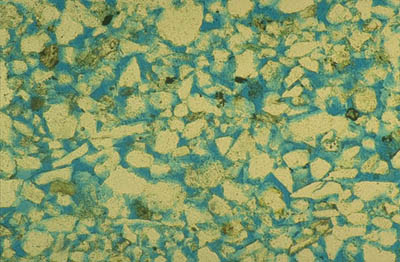1. adj. []
Pertaining to rocks that incorporate pores or void spaces, which can contain air, water, hydrocarbons or other fluids. In a body of rock, the percentage of pore space is the porosity. Porosity can be a relic of deposition (primary porosity, such as space between grains that were not compacted together completely) or can develop through alteration of the rock (secondary porosity, such as when feldspar grains or fossils are preferentially dissolved from sandstones). Porosity can be generated by the development of fractures, in which case it is called fracture porosity. Effective porosity is the interconnected pore volume in a rock that contributes to fluid flow in a reservoir. It excludes isolated pores. Total porosity is the total void space in the rock whether or not it contributes to fluid flow. Thus, effective porosity is typically less than total porosity. Shale gas reservoirs tend to have relatively high porosity, but the alignment of platy grains such as clays makes their permeability very low.
See related terms: carbonate, compaction correction, consolidated, cubic packing, diagenesis, diagenetic porosity, differential compaction, dolomite, dolomitization, effective porosity, evaporite, feldspar, fracture porosity, horizon, impermeable, moldic porosity, pay, permeability, petrography, pore, primary porosity, reef, reservoir, rhombohedral packing, sandstone, saturation, secondary porosity, sorting, vesicular porosity, vugular porosity
